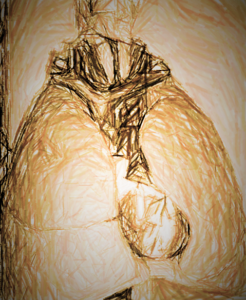Thyroid dysfunction and lungs
Thyroid dysfunction affects the way the lungs work. It is not surprising as thyroid hormones have receptors in every tissue and drive the energy formation in every cell including the lung tissue.
I remember way back when I was on suboptimal thyroid hormonal replacement (levothyroxine only), I was short of breath often. I remember that once I was not able to catch a breath for few minutes, I was trying to breathe and no air was getting in my lungs. It was a very scary experience and I made an appointment to see a doctor the same day. I explained my symptoms to the doctor but since I was better, the doctor was clueless to a cause of my problem. Looking back, I now know what my respiratory distress was caused by. It was caused by thyroid hormonal imbalance and insufficiency of T3 hormone. My T4 hormone then was truly up in the top range but my T3 was just low borderline in the reference range. My TSH was swinging up and down, which is quite common even with minimal T3 insufficiency.
Lung function is compromised with thyroid dysfunction, both hypothyroidism and hyperthyroidism. Both of these conditions may result in respiratory muscle weakness and a compromised lung function and capacity.
Respiratory distress and hyperthyroidism is more evident on physical exertion. Shallow, faster breathing may be a feature of hyperthyroidism. Sometimes, the breathing can be difficult or labored even at rest. I remember when I had active Graves’ disease I tried to breathe in a shallow way sometimes when I had experienced a sharp pain in my chest. People with Grave’s disease may also feel like having a tight collar around their neck due to a compression of trachea by an enlarged thyroid which makes breathing more strenuous. This can also occur with nodular goiter and thyroid cancers. I remember when as a student I was testing my lung capacity as a part of our studies. I was surprised then that it was much lower than my fellow classmates.
In hypothyroidism, that is when the thyroid function is low, respiratory symptoms are more common. Respiratory distress can be seen with exertion or at rest but can also be seen as sleep apnoea, air hunger, constant colds and dry coughs. The range of symptoms varies according to the degree of severity of hypothyroidism, from mild difficulties in breathing up to respiratory failure.
A study (1) on interstitial lung disease (when lung tissue is damaged and scarred) associated with autoimmune thyroiditis (ILD-AT) suggest that “Patients with interstitial lung disease of unknown origin should be tested for AT.”
The respiratory muscles are weaker and lungs have reduced capacity with thyroid dysfunction. In a study (2) it was shown that “Patients with idiopathic chronic cough and unexplained airflow obstruction in non-smokers have been shown to have an increased prevalence of hypothyroidism and other organ specific autoimmune disorders.”
The respiratory problems in people with hypothyroidism are much more common than in general population. Hypothyroid person may have asthma like symptoms at times and feel like trying to breathe through a straw. This is also common when adrenal dysfunction is lowered, which often co- occurs with thyroid problems. Hypothyroidism may cause some changes to pulmonary tissue and fluid retention. Additionally, people with autoimmune thyroiditis may have problems with low iron levels which may also contribute to a respiratory distress causing breath shortness. It is not easy climbing high stairs with hypothyroidism and low iron…
People with hypothyroidism can improve their lung function with levothyroxine (10). However, it was noted in a study (4) that hypothyroid patients under levothyroxine treatment had impaired exercise capacity. Therefore it might be important to look at optimizing the hormonal replacement by adding T3 hormone or natural desiccated thyroid which many patients consider a superior hormonal replacement. The respiratory problems can be reversed with optimal thyroid hormonal changes although some changes might not be reversible depending on a duration/ severity of hypothyroidism and the age of a person.
Also, a study revealed that females on levothyroxine only hormonal replacement have a higher chance of getting a lung cancer (11) due to an increased oxidative stress. The study had found no correlation of levothyroxine only hormonal replacement with breast, colorectal and gastric cancer.
On a personal note, my respiratory distress went away with optimal thyroid hormonal replacement (combined levothyroxine and natural desiccated thyroid hormonal replacement).
Weight reduction (though not easy with thyroid issues), gentle exercise (like walking), breathing exercises and essential fatty acids (omega 3) help lung function get better. Selenium, magnesium and potassium minerals are important for healthy lungs and for people with thyroid autoimmunity. Diet rich in organic leafy greens may help. Eating small variety of fish (such as sardines) 2-3 times a week may provide the omega 3.
Please see your doctor if you have shortness of breath and difficulties in breathing.
This blog is for educational purposes only.
References:
- Igor Stepanyan, Marina Kovalevskaya, Evgenij Shmelev. Interstitial lung disease associated with autoimmune thyroiditis (ILD-AT). European Respiratory Journal. 2014. URL: http://erj.ersjournals.com/content/40/Suppl_56/P3645
- S. Birring, A J Morgan, B Prudon, T M McKeever, S A Lewis, J F Falconer Smith, R J Robinson, J R Britton, I D Pavord. Respiratory symptoms in patients with treated hypothyroidism and inflammatory bowel disease. BMJ. URL: http://thorax.bmj.com/content/58/6/533
- Samiaa Hamdy Sadek, Walaa Anwar Khalifa, and Ahmad Metwally Azoz. Pulmonary consequences of hypothyroidism. Ann Thorac Med. 2017 Jul-Sep; 12(3): 204–208. URL: https://www.ncbi.nlm.nih.gov/pmc/articles/PMC5541969/
- Biondi B, Fazio S, Cuocolo A, Sabatini D, Nicolai E, Lombardi G, et al. Impaired cardiac reserve and exercise capacity in patients receiving long-term thyrotropin suppressive therapy with levothyroxine. J Clin Endocrinol Metab. 1996; 81:4224–8.
- Caraccio N, Natali A, Sironi A, Baldi S, Frascerra S, Dardano A, et al. Muscle metabolism and exercise tolerance in subclinical hypothyroidism: A controlled trial of levothyroxine. J Clin Endocrinol Metab. 2005; 90:4057–62.
- Cakmak G, Saler T, Saglam ZA, Yenigun M, Ataoglu E, Demir T, Temiz LU. Pulmonary functions in patients with subclinical hypothyroidism. 2011 Oct; 61(10):951-3.
- Seethalakshmi Krishna Iyer, Sunil K Menon, and Biju Bahuleyan. An Analysis of Dynamic Pulmonary Functions of Hypothyroid Patients. J Clin Diagn Res. 2017 Mar; 11(3): CC10–CC12. URL: https://www.ncbi.nlm.nih.gov/pmc/articles/PMC5427303/
- Bassi R, Dhillon SK, Sharma S, Sharma A, Tapdiya M. Effect of thyroid hormone replacement on respiratory function tests in hypothyroid women. Pak J Physiol. 2012; 8(2):20–23.
- Hellermann J, Kahaly G. Cardiopulmonary involvement in thyroid gland diseases]. [Article in German] 1996 May;50(5):375-80.
- Akha O, Kashi Z, Poor AS, Zadeh ZT, Zakeri HR. Evaluation of levothyroxine effect on pulmonary function in hypothyroidism. J Mazandaran Univ Med Sci. 2008;18:1–6.
- Umberto Cornelli, Gianni Belcaro, Martino Recchia and Annarosa Finco. Levothyroxine and lung cancer in females: the importance of oxidative stress. Cornelli et al. Reproductive Biology and Endocrinology 2013, 11:75 URL: http://www.rbej.com/content/pdf/1477-7827-11-75.pdf


very informative as I have Hashimoto’s and have been messed about with replacement hormone Levo did not get absorbed and then put on T3 combo Then taken off T3 as told it was too expensive. Consultant now put me back on just T3 and is experimenting on dosage. meanwhile GP say I have moderate COPD based on Spirometry however I have debated I have no symptoms of this moderate diagnosis . They seem to be rather perplexed by this but do not look at the Thyroid issues which leaves me confused.
Hi Chris,
Consider seeing an integrative medical doctor, who specializes in medical and natural therapies. You might also consider taking Armour thyroid (desiccated pig thyroid) which many patients consider superior. Unfortunately only integrative medical practitioners prescribe Armour (try contacting a local compounding pharmacy to find one in your area). I take slow release Armour with Eutroxsig every day which works very well for me. T3 can also be made in a slow release formulation which might be a gentler option.
Best regards
Jolanta Krywult
Nice post.
Thank you Anna.